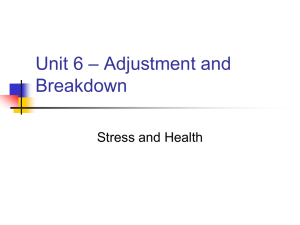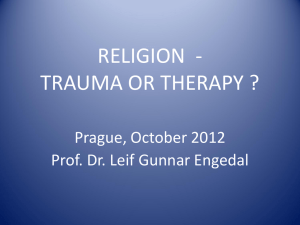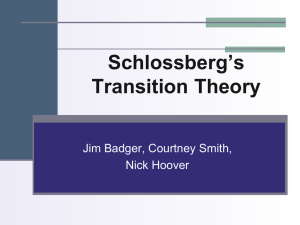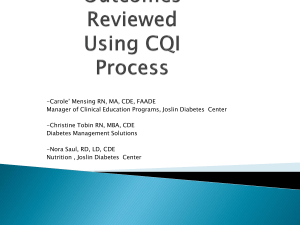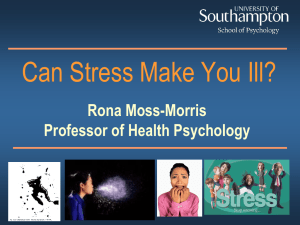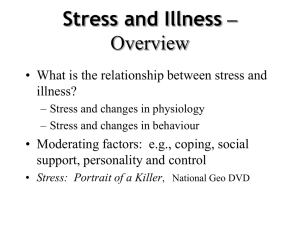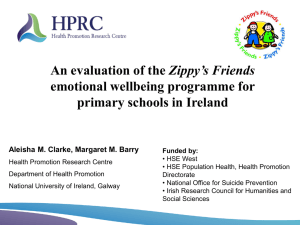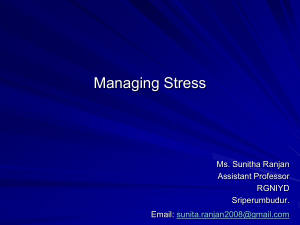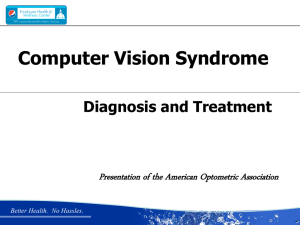Ch 14 PP
advertisement
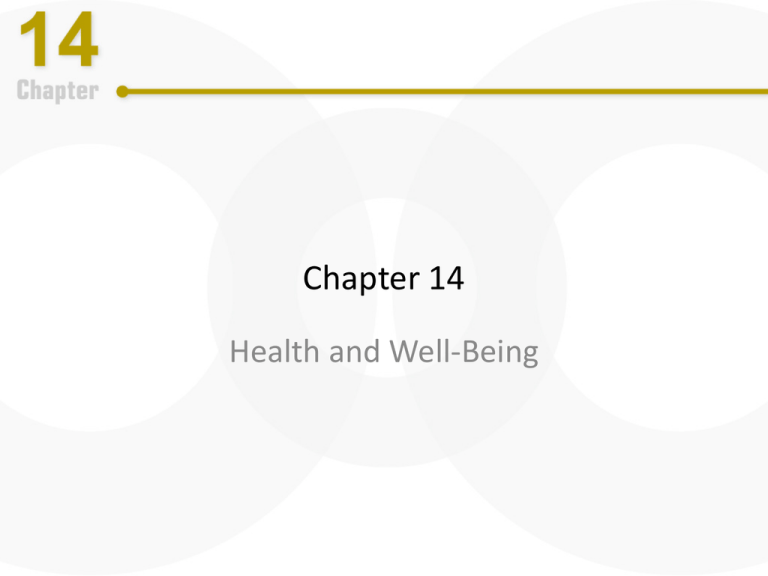
Chapter 14 Health and Well-Being Health Psychology • The application of psychology to the promotion of physical health and the prevention and treatment of illness. • But isn’t physical illness a purely biological event? Stress and Health Stress • An unpleasant state of arousal that arises when we perceive that the demands of an event threaten our ability to cope effectively. • Subjective appraisal of the situation determines: – How we will experience the stress – What coping strategies we will use Stress (cont’d) • Appraisal is the process by which people make judgments about the demands of potentially stressful events and their ability to meet those demands. • Coping is an effort to reduce stress. What Americans Cite as Top Stressors The Stress and Coping Process What Causes Stress? Crises and Catastrophes • Stressors: Anything that causes stress. • Posttraumatic Stress Disorder (PTSD): A person experiences enduring physical and psychological symptoms after an extremely stressful event. Major Life Events • Change itself may cause stress by forcing us to adapt to new circumstances. • Is change, positive or negative, necessarily harmful? – No support that positive “stressors” are as harmful as negative stressors. – Impact of change depends on person and how change is interpreted. Microstressors: The Hassles of Everyday Life • Most common source of stress arises from the daily hassles that irritate us. – e.g., environmental factors. • “Microstressors” place a constant strain on us. – The accumulation of daily hassles contributes more to illness than do major life events – e.g., job, commuting, paying the bills, etc. How Does Stress Affect the Body? General Adaption Syndrome • Three-stage bodily response to stress – Alarm – Resistance – Exhaustion • Stress may be a short-term reaction to a threat, but over time it compromises health and well-being. The General Adaptation Syndrome What Stress Does to the Heart • Type A Behavior Pattern: Characterized by extremes of competitive striving for achievement, a sense of time urgency, hostility, and aggression. – A risk factor for coronary heart disease (CHD)? • Hostility appears to be the main toxic ingredient in CHD. Why Is Hostility and CHD Linked? • Cardiovascular system becomes overworked. • Hostile people are less health conscious. • Hostile people are physiologically reactive. – In tense social situations, they exhibit more intense cardiovascular reactions. • Psychocardiology is a new field that has emerged from this research that attempts to merge the heart and the mind How “Hostile” Is Your Pattern of Behavior? What Stress Does to the Immune System • Stress compromises the body’s immune system. • Psychoneuroimmunology (PNI): A subfield of psychology that examines the links among psychological factors, the brain and nervous system, and the immune system. Pathways From Stress to Illness Links Between Stress and Illness • Research has shown that stress breaks down a body’s immune system – The longer a stressor persists, the more likely the person is to get sick • Personal characteristics can buffer adverse effects Stress Duration and Illness Process of Appraisal Attributions and Explanatory Styles • Seligman (1975): Depression results from learned helplessness. • Abramson et al. (1989): Depression is a state of hopelessness brought on by the negative self-attributions people make for failure. – Depressive explanatory style Using Attributional Styles to Predict Depression The Human Capacity for Resilience • Individuals exhibit three characteristics: – Commitment – Challenge – Control • Hardiness serves as a buffer against stress. – Perception of control is most important factor. Self-Efficacy • The expectation that our behaviors can produce satisfying outcomes • Self-efficacy: Feelings of competence – A state of mind that varies from one specific task and situation to another • Research has shown the more self-efficacy one has, the more willing to take on a task, persist, and succeed Self-Efficacy: A Matter of Life or Death? Dispositional Optimism • Optimism is a generalized tendency to expect positive outcomes. • How can optimism promote positive health outcomes? – Biological – blood samples show optimists exhibit stronger immune response to stress – Behavioral – explanatory style Hopelessness and the Risk of Death Pollyanna’s Health • Positive thinking cannot guarantee good health. – Victims of illness do not just have a “bad attitude.” • Limits to positive thinking. – Especially if it leads us to see ourselves and events in ways that are not realistic. Ways of Coping with Stress How Americans Manage Stress Ways of Coping with Stress Coping Strategies • Problem-focused coping • Emotion-focused coping • Proactive coping Problem-Focused Coping • In dealing with essential tasks, it is better to confront and control than to avoid. • Why is it not always a beneficial approach? – Can be physiologically taxing – Can lead to development of an over-controlling, stress-inducing Type A pattern of behavior Emotion-Focused Coping • Positive Emotions – Broaden – Build • Shutting down and trying to deny or suppress the unpleasant thoughts and feelings. – Distraction can be an adaptive form of avoidance coping. – Concealing one’s innermost thoughts and feelings can be physiologically taxing. Emotion-Focused Coping: Opening Up • Two aspects to opening up as an emotional means for coping with stress: – One must acknowledge and understand one’s emotional reactions to important events. – One must express those inner feelings to themselves and others. • Why might opening up be helpful? – Cathartic experience? – Helps to gain insight into the problem? Self-Focus: Getting Trapped vs. Getting Out • Self-awareness theory revisited. • A self-perpetuating feedback loop can occur: – Being in a bad mood triggers self-focus. – Self-focus in people with low self-esteem further worsens the mood. Self-Focus: Getting Trapped vs. Getting Out (cont’d) • Gender differences: Women brood and men act out. • Healthier alternatives: Getting absorbed in difficult, demanding, and fully engaging activity – E.g., aerobic exercise, writing, reading, gardening Proactive Coping • The helpful coping resources provided by friends and other people. – Has therapeutic effects on both our psychological and physical health. • Social support and contact related to longevity. Aspinwall and Taylor’s Model of Proactive Coping Social Support • Simple social contact model – How many social contacts does a person have? • Diversity of person’s social network • Intimacy model – Does the person have a close relationship with a significant other? • Perceived availability – Does the person believe that ample support is available when needed? Does Being Popular Always Promote Health? The Religious Connection • Religion provides an important source of social and emotional support for many. – Only 15-20% of the world’s population have no religious affiliation. • Is there a link between religiosity and health? – Research is suggestive that there is, but not yet conclusive Culture and Coping Culture and Coping • Do people in all cultures solve problems and cope in the same ways? • Collectivist vs. Individualist cultures – Implicit social support vs. explicit social support Collectivist Coping Styles Culture and Social Support Treatment and Prevention Treatment: The “Social” Ingredients • All healers provide social support. • All therapies offer a ray of hope. – All therapies communicate and instill positive expectations. • Patients can make meaningful choices about the treatment. Prevention: Getting the Message Across • We live in what could aptly be described as the era of prevention in that many serious health threats are preventable. Aiming For Good Health The Pursuit of Happiness Subjective Well-Being • One’s happiness, or life satisfaction, as measured by self-report. • In self-reports, 75% of American adults describe themselves as happy. • What predicts happiness? – Social relationships – Employment status – Physical health National Happiness Rankings Does Money Buy Happiness? • Perceptions of wealth are not absolute but relative to certain standards. – Social comparison theory revisited. • People use their own recent past as a basis of comparison. – Adaptation-level theory revisited. Wealth and Subjective Well-Being A Set Baseline Level of Happiness? • Ratings of happiness are higher among identical twins than among fraternal twins. • Fluctuations in mood that accompany positive and negative life events wear off over time. • Happiness levels are relatively stable over time and place. Emerging Science on How to Increase Happiness • The pursuit of happiness is a powerful human motive that is still not fully understood. • The research described in this section offers some concrete advice on how people can maximize their levels of happiness What Yields More Happiness: Experiences or Material Objects? Bhutan’s Gross National Happiness (GNH) Indicators

